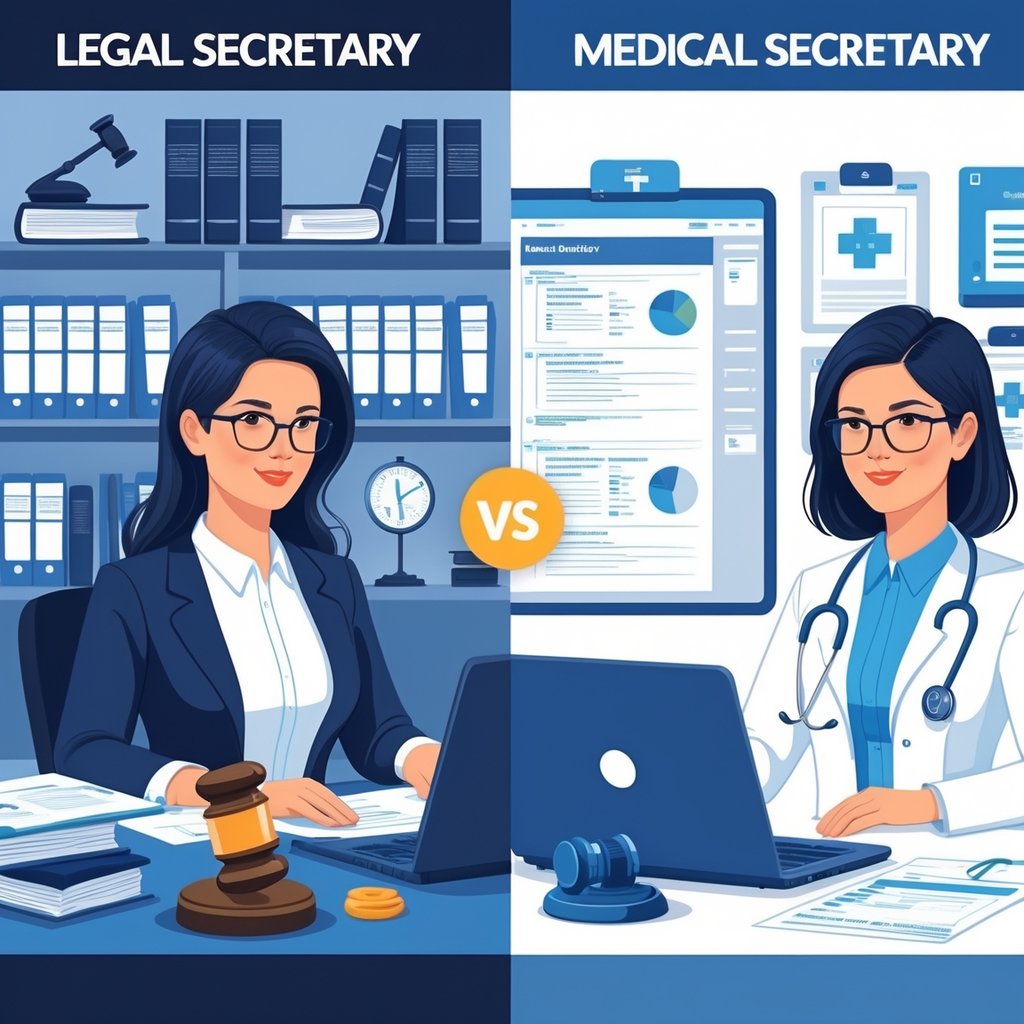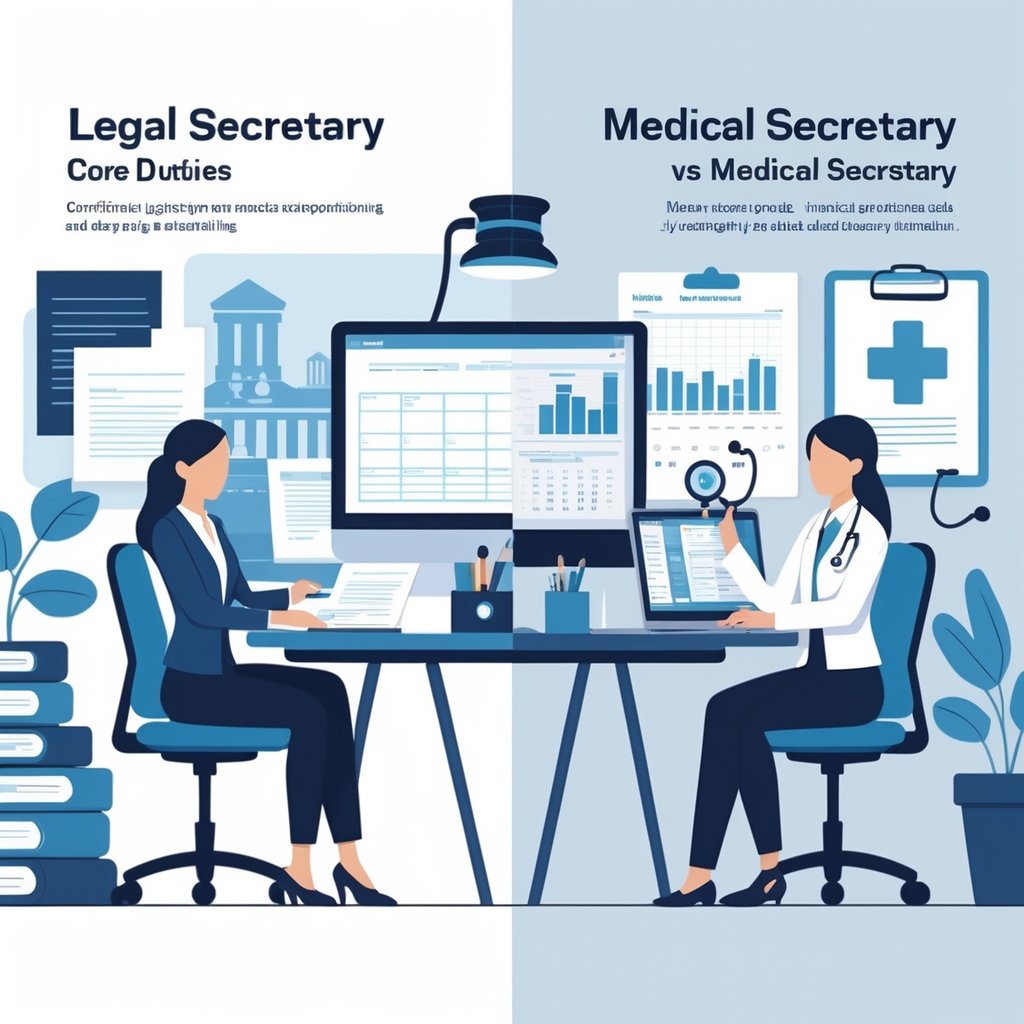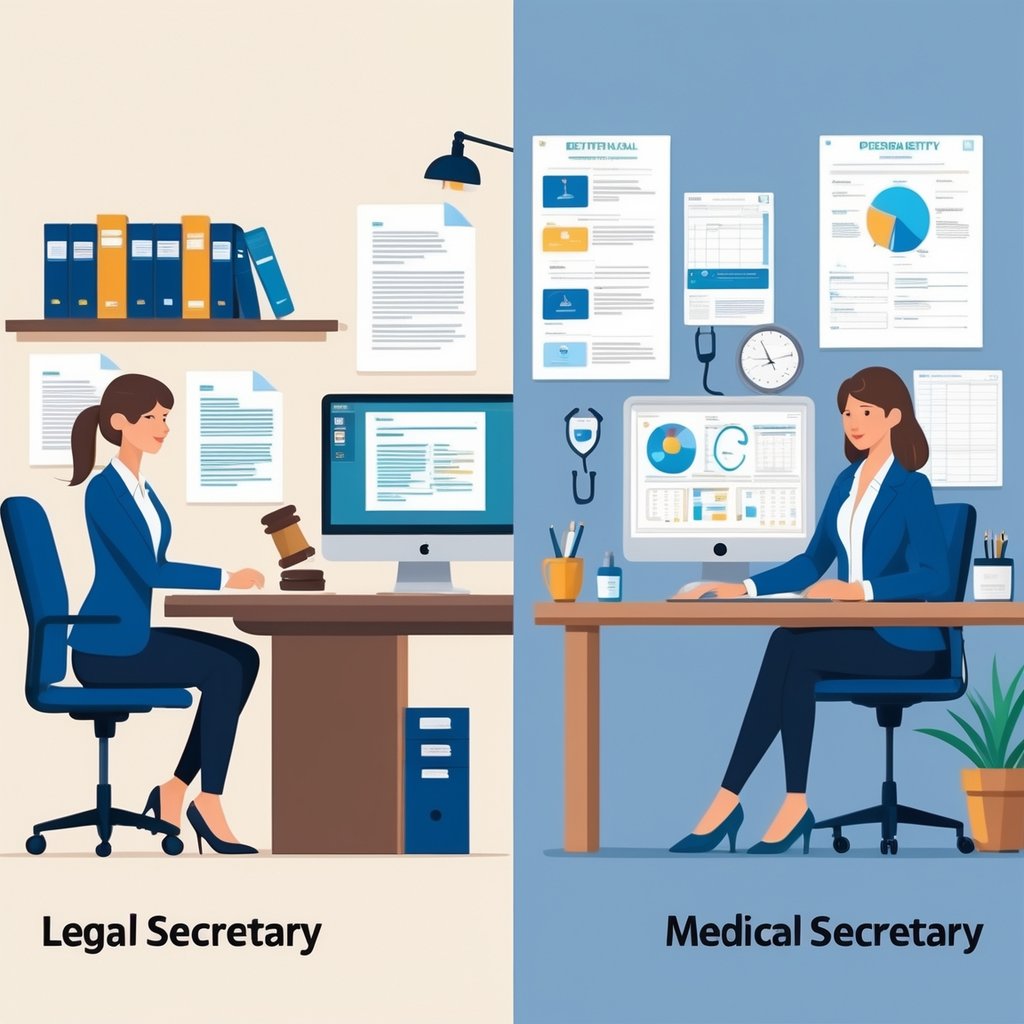Legal secretaries and medical secretaries both work in office settings. They serve very different industries with unique demands.
Both roles involve administrative tasks like scheduling and filing. The knowledge and skills needed for each position are quite different.
The main difference between legal secretaries and medical secretaries is their specialized knowledge. Legal secretaries need understanding of court procedures and legal documents, while medical secretaries must know medical terminology and healthcare procedures. Legal secretaries handle administrative duties within law offices, including managing legal paperwork and court schedules.
Medical secretaries use specific knowledge of medical terminology and clinical procedures to support healthcare operations. Your choice between these careers depends on your interests and the type of environment where you want to work.
Legal secretaries typically work in law firms or corporate legal departments. Medical secretaries find opportunities in hospitals, clinics, and medical offices.
Key Takeaways
- Legal secretaries specialize in law office administration while medical secretaries focus on healthcare facility operations
- Both roles require strong organizational skills but demand different specialized knowledge and terminology
- Career opportunities exist in different workplace settings with varying salary ranges and advancement paths
Overview of Legal Secretary and Medical Secretary Roles

Legal secretaries work in law firms and legal departments. Medical secretaries serve in healthcare settings.
Both roles require specialized knowledge of their industry terminology and procedures.
Definition of Legal Secretary
A legal secretary is an administrative assistant trained exclusively in the field of law. You work as a skilled professional who supports attorneys and legal teams with specialized tasks.
Your daily duties include typing legal documents, transcribing court materials, and filing paperwork. You handle correspondence between clients and lawyers.
You also manage case files and maintain legal records. Legal secretaries possess specific knowledge of legal terminology, procedures, and documentation.
This specialized training sets you apart from general office workers. You understand court deadlines, legal forms, and proper document formatting.
Your role needs attention to detail and accuracy. You prepare subpoenas, motions, and briefs under attorney supervision.
You schedule depositions and court appearances for legal staff.
Definition of Medical Secretary
Medical secretaries work in healthcare facilities like hospitals, clinics, and doctor’s offices. You serve as the administrative backbone of medical practices.
Your role combines general office skills with healthcare-specific knowledge. You schedule patient appointments and manage medical records.
You handle insurance forms and billing procedures. You communicate with patients, doctors, and insurance companies daily.
What differentiates a medical secretary from other secretaries is their knowledge of medical procedures, terminology, and software systems. You understand medical codes, patient privacy laws, and healthcare regulations.
Your duties include greeting patients and updating their information. You process test results and coordinate care between different providers.
You maintain electronic health records and ensure compliance with medical standards.
Work Environments and Industries
Legal secretaries primarily work in law firms of various sizes. You might find positions in corporate legal departments, government agencies, or nonprofit organizations.
Some work in specialized areas like criminal law, family law, or corporate litigation. In larger firms, you might work as a float secretary who moves between different legal teams.
Smaller practices often need you to handle multiple types of legal work. Medical secretaries work in diverse healthcare settings.
You can find jobs in private medical practices, hospitals, specialty clinics, or urgent care centers. Some positions are in insurance companies or medical billing offices.
Your work environment depends on the medical specialty. Pediatric offices have different needs than surgical practices.
Mental health clinics require different skills than emergency departments.
Core Duties and Responsibilities

Legal secretaries handle court documents and support attorneys with case preparation. Medical secretaries manage patient records and work with healthcare terminology and insurance billing.
Legal Secretary Duties
As a legal secretary, you perform administrative duties that keep law offices running smoothly. You type legal documents like contracts, briefs, and motions.
Your main tasks include:
- Filing court documents and maintaining case files
- Scheduling appointments with clients and court dates
- Transcribing dictation from attorneys
- Managing correspondence with clients and other law firms
You answer phones and greet clients who visit the law office. You also prepare legal forms and proofread documents for accuracy.
Legal secretaries work closely with attorneys to handle case preparation. You organize evidence and maintain client files.
You track important deadlines for court filings. Your knowledge of legal terminology helps you understand complex documents.
You format legal papers according to court requirements.
Medical Secretary Duties
Medical secretaries use specialized knowledge of medical terminology and healthcare procedures. You schedule patient appointments and manage medical records.
Your daily responsibilities include:
- Billing patients and processing insurance claims
- Maintaining medical charts and patient files
- Scheduling procedures and lab tests
- Handling patient inquiries about appointments and results
You work with electronic health records systems. You organize medical and paper records to keep patient information accessible.
You communicate with insurance companies about coverage and claims. You coordinate with other healthcare providers for patient referrals.
Medical secretaries compile and record medical charts and reports. You understand medical procedures and can explain basic information to patients.
Comparison of Administrative Tasks
Both roles involve similar office duties like answering phones and filing documents. The specialized knowledge differs greatly between fields.
Legal secretaries focus on:
- Court deadlines and legal procedures
- Attorney support and case management
- Legal document formatting
Medical secretaries focus on:
- Patient care coordination
- Medical billing and insurance
- Healthcare record management
Medical office secretaries typically earn less than general secretaries, averaging $32,609 compared to $36,442 annually.
Both positions require strong computer skills and attention to detail. You need excellent communication abilities in either role.
Skills and Qualifications Required

Legal secretaries and medical secretaries need different educational backgrounds and skill sets. Legal secretaries focus on law-related knowledge while medical secretaries require healthcare expertise.
Educational Background
Most legal secretary positions require a high school diploma plus specialized training. You can get this training through community colleges, vocational schools, or legal secretary programs.
Many employers prefer candidates with post-secondary certificates in legal studies. These programs teach you about legal procedures, court systems, and law office management.
Some legal secretaries start as general administrative assistants and learn on the job. Working closely with attorneys and paralegals helps you gain practical experience.
Medical secretaries typically need a high school diploma and specialized medical training. You can complete medical secretary programs at community colleges or vocational schools.
These programs cover medical terminology, healthcare procedures, and medical coding systems. Many employers prefer candidates with certificates in medical office administration.
Some positions require knowledge of specific medical software systems. Healthcare facilities often provide additional training for their electronic health record systems.
Technical and Soft Skills for Each Role
Legal secretaries need strong technical skills for law office operations. You must be proficient in word processing, spreadsheet applications, and legal document management systems.
Technical skills for legal secretaries include transcription, desktop publishing, and video conferencing software. Fast typing speed of 50-100 words per minute is essential.
You need excellent writing skills to draft correspondence and proofread legal documents. Legal secretaries handle writing tasks that attorneys don’t have time to complete.
Key legal secretary skills:
- Legal document formatting
- Court filing procedures
- Legal research assistance
- Calendar and deadline management
- Client communication
Legal secretaries must understand legal terminology and documents. This knowledge separates you from general administrative roles and helps you support attorneys effectively.
Medical secretaries require different technical abilities focused on healthcare systems. You need proficiency in medical billing software, electronic health records, and appointment scheduling systems.
Medical secretaries differ from other secretaries because of their knowledge of medical procedures and terminology. You must understand insurance processes and medical coding basics.
Essential medical secretary skills:
- Medical terminology
- Insurance verification
- Patient communication
- Medical record organization
- HIPAA compliance knowledge
Both roles require strong interpersonal skills for daily interactions. You’ll communicate with clients, patients, attorneys, doctors, and other professionals regularly.
Organization skills are critical for both positions. Legal secretaries manage case files and court deadlines while medical secretaries handle patient records and appointment schedules.
Workplace Settings and Daily Operations

Legal secretaries work in law firms and corporate legal departments. Medical secretaries operate in hospitals, clinics, and private practices.
Each setting shapes their daily tasks and workflow patterns.
Typical Workplaces for Legal Secretaries
You will find legal secretaries primarily working in law firms of various sizes. Small law firms employ one or two legal secretaries who handle multiple practice areas.
Large law firms organize their legal secretaries by specialty departments. You might work exclusively with corporate lawyers or litigation teams.
This specialization lets you develop deep knowledge in specific legal areas. Corporate legal departments also hire legal secretaries.
You would support in-house attorneys who handle the company’s legal matters. These positions often offer more regular hours than traditional law firm roles.
Government agencies employ legal secretaries too. You could work for district attorney offices, public defender offices, or regulatory agencies.
Your duties would focus on criminal cases or administrative law matters. Your daily operations center around court deadlines and legal procedures.
You manage attorney calendars, prepare court filings, and draft legal documents. Case management becomes a critical part of your routine.
The legal environment requires strict attention to confidentiality rules. You handle sensitive client information and privileged communications daily.
Typical Workplaces for Medical Secretaries
You will work in hospitals, where medical secretaries support various departments. Large hospitals employ dozens of medical secretaries across different specialties like cardiology, oncology, and surgery.
Private medical practices hire medical secretaries to manage patient care coordination. You would handle appointment scheduling, insurance verification, and patient records.
Small practices often need you to wear multiple hats. Specialty clinics focus on specific medical areas like dermatology or orthopedics.
Your role becomes more specialized as you learn terminology and procedures unique to that medical field. Outpatient surgery centers employ medical secretaries to coordinate pre-operative and post-operative care.
You manage surgical schedules and communicate with patients about procedures. Your daily operations revolve around patient care timelines.
You coordinate between doctors, nurses, and patients to ensure smooth healthcare delivery. Insurance requirements heavily influence your workflow.
Medical records management takes up significant portions of your day. You maintain electronic health records and ensure HIPAA compliance with all patient information.
Salary and Career Progression

Both legal and medical secretaries earn competitive salaries with clear paths for advancement. Legal secretaries usually earn more than medical secretaries.
Both fields offer opportunities to move into higher-level administrative and management roles.
Legal Secretary Salary Range
Legal secretary salaries vary significantly based on location, experience, and firm size. Entry-level positions start around $35,000 annually.
Experienced legal secretaries usually earn between $45,000 and $65,000 per year. Large law firms in major cities tend to pay the most.
Your salary depends on several key factors:
- Geographic location — Urban areas pay 20 to 30 percent more
- Firm size — Large firms offer higher compensation
- Years of experience — Senior secretaries earn much more
- Specialization — Corporate law and litigation pay premium rates
Legal secretaries often earn more than regular secretaries because of the specialized legal knowledge required. The legal field usually offers solid benefits like health insurance and retirement plans.
Medical Secretary Salary Range
Medical secretary positions offer steady income with some growth potential. Starting salaries range from $28,000 to $35,000 annually.
Experienced medical secretaries can make between $35,000 and $48,000 per year. Hospitals and specialty clinics usually pay more than small practices.
Your earning potential goes up with:
- Healthcare setting — Hospitals pay more than clinics
- Medical specialty — Surgical and cardiology practices pay higher wages
- Certifications — Credentials in medical coding or billing boost pay
- Administrative skills — Good computer skills increase your value
Medical secretaries in big cities earn 15 to 25 percent more than those in rural areas. Healthcare jobs come with job security and decent benefits.
Advancement Opportunities
Both career paths have routes for moving up into management or specialized roles. You can often advance without needing more formal education.
Legal Secretary Career Path:
- Senior Legal Secretary
- Paralegal or Legal Assistant
- Legal Office Manager
- Court Administrator
Medical Secretary Career Path:
- Medical Administrative Assistant
- Medical Office Manager
- Healthcare Administrator
- Executive Administrative Assistant
Medical administration careers show strong growth potential. You can specialize in areas like medical coding, patient relations, or practice management.
Extra certifications and training help you move up faster and earn more.
Interaction With Other Professionals

Legal secretaries work closely with attorneys and paralegals in law offices. Medical secretaries team up with doctors, nurses, and healthcare staff in clinics or hospitals.
Collaboration With Attorneys and Paralegals
As a legal secretary, you work directly with attorneys every day. Your main job is to help prepare legal documents and manage busy schedules.
Daily Tasks With Attorneys:
- Type legal briefs and court filings
- Schedule client meetings and court dates
- Answer phone calls from clients
- Keep track of case deadlines
You also work with paralegals on a regular basis. Legal secretaries and paralegals have different education requirements, but you support each other’s work.
Working With Paralegals:
- Help organize case files
- Share client information
- Coordinate document preparation
- Assist with research tasks
You need to understand legal terms and court procedures. Keeping all client information private and secure is a must.
Attorneys rely on you to keep the office running smoothly. You handle the paperwork so they can focus on their legal work.
Coordination With Healthcare Staff
As a medical secretary, you spend your days with doctors, nurses, and medical assistants. Medical secretaries act as the face of the doctor’s office and help coordinate patient care.
Working With Doctors:
- Schedule patient appointments
- Prepare medical charts before visits
- Take messages from patients
- Handle prescription requests
Supporting Nurses and Medical Assistants:
- Update patient records in computer systems
- Coordinate lab test results
- Schedule follow-up appointments
- Manage patient check-ins
You serve as the main communication link between patients and medical staff. When patients call with questions, you direct them to the right person.
Medical assistants handle clinical tasks while you focus on office work. You both work together to keep patient information organized and current.
Your job helps the medical team provide better patient care by keeping things organized.
Key Differences Summarized

Legal secretaries and medical secretaries work in totally different fields, each with unique skills and daily routines. Your choice between these jobs really comes down to your interest in law or healthcare, and the kind of workplace you want.
Distinctive Duties and Impact
Legal Secretary Responsibilities:
- Draft and proofread legal documents like contracts and pleadings
- Manage attorneys’ schedules and organize case files
- Handle court filings and deadline management
- Communicate with clients and court officials
Medical Secretary Responsibilities:
- Schedule appointments and bill patients
- Organize medical records and patient charts
- Use medical terminology and healthcare software
- Coordinate with doctors and insurance companies
The knowledge base is pretty different. Legal secretaries need training in law office procedures, while medical secretaries must know healthcare terms and privacy laws.
Legal secretaries help attorneys meet court deadlines and prepare cases. Medical secretaries keep patient care on track by managing schedules and records.
Which Career Path to Choose
Salary expectations can shape your decision. Medical office secretaries earn an average of $32,609 annually, while legal secretaries often earn more because of their specialized legal knowledge.
Think about your preferred work environment. Legal secretaries work in law firms with more formal atmospheres and tight deadlines. Medical secretaries work in hospitals or clinics, often with a patient-focused vibe.
Your personality plays a role in job satisfaction. If you like detailed document prep and legal procedures, legal secretary work might suit you. If you prefer helping patients and being in healthcare, medical secretary roles could be a better fit.
Training needs are different:
- Legal secretaries need to know legal terminology and court procedures
- Medical secretaries need medical terminology and healthcare software skills
Both careers offer steady jobs, but your long-term growth depends on which field excites you more.
Frequently Asked Questions
People often have specific questions about career requirements, day-to-day work, and pay differences between these secretary roles. Here are some answers to common questions.
What qualifications are required for a medical secretary?
You need a high school diploma or the equivalent to work as a medical secretary. Most employers prefer some post-secondary education in medical administration or office management.
You should know medical terminology and have basic computer skills. Many jobs want experience with electronic health records and insurance billing.
Some employers provide on-the-job training for entry-level roles. Still, a medical secretary certificate can give you a real edge.
What are the primary responsibilities of a legal secretary?
You prepare legal documents and manage attorney calendars. You’ll also handle client communications and keep case files organized.
Legal secretaries handle administrative and clerical tasks to support attorneys. You might schedule depositions, court hearings, and client meetings.
You need to know legal terms and court procedures. Filing legal documents and serving subpoenas come with the territory.
How do the roles of legal assistant, legal secretary, and paralegal differ?
Legal assistants split their time between paralegal and secretary duties, including research and filing. They usually need a paralegal certificate.
Paralegals focus more on legal research and preparing documents. They get involved in case strategy and legal analysis.
Legal secretaries handle routine admin work and keep the office running. You’ll do more clerical work and less research than a paralegal.
Can a medical secretary transition into a nursing role, and if so, what steps must be taken?
You can’t move directly from medical secretary to nurse without more schooling. Nursing requires a degree from an accredited program and passing the NCLEX exam.
You’ll have to enroll in an Associate Degree in Nursing (ADN) or Bachelor of Science in Nursing (BSN) program. These usually take two to four years.
Your medical office experience and terminology knowledge will help in nursing school, but you still need to finish all coursework, clinicals, and licensing like any other nursing student.
What type of training or courses are necessary to become a medical secretary?
You can take a medical secretary certificate program at a community college or vocational school. These usually last six months to two years.
Key courses include medical terminology, anatomy and physiology, and health information management. You’ll also learn medical coding, billing, and electronic health records.
Computer skills are a must for using medical software. Many programs add communication skills and medical ethics to the mix.
What is the average salary range for a legal secretary compared to a medical secretary?
Legal secretaries earn an average salary of $41,725. That number usually sits above what medical secretaries bring in.
This pay gap comes from the specialized legal knowledge needed in the role. Legal work just demands a different set of skills.
Medical secretaries usually make somewhere between $35,000 and $45,000 a year. Location and experience play a big part in the final number.
Hospitals and clinics in bigger cities tend to offer higher pay. Rural spots? Not so much.
Experience and certifications can push your salary higher in both jobs. If you know your way around corporate law or litigation as a legal secretary, you might see even better paychecks.












